Labrador | |
|---|---|
| Municipality of Labrador | |
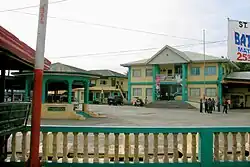 Poblacion and Municipal Hall | |
 Seal | |
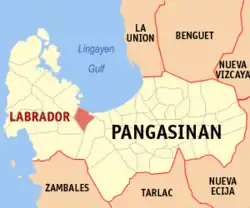 Map of Pangasinan with Labrador highlighted | |
OpenStreetMap | |
.svg.png.webp) Labrador Location within the Philippines | |
| Coordinates: 16°02′02″N 120°08′21″E / 16.03389°N 120.13917°E | |
| Country | Philippines |
| Region | Ilocos Region |
| Province | Pangasinan |
| District | 2nd district |
| Founded | May 15, 1857 |
| Named for | San Isidro de Labrador |
| Barangays | 10 (see Barangays) |
| Government | |
| • Type | Sangguniang Bayan |
| • Mayor | Dominador V. Arenas |
| • Vice Mayor | Melchora A. Yaneza |
| • Representative | Jumel Anthony I. Espino |
| • Municipal Council | Members |
| • Electorate | 18,974 voters (2022) |
| Area | |
| • Total | 90.99 km2 (35.13 sq mi) |
| Elevation | 81 m (266 ft) |
| Highest elevation | 776 m (2,546 ft) |
| Lowest elevation | 0 m (0 ft) |
| Population (2020 census)[3] | |
| • Total | 26,811 |
| • Density | 290/km2 (760/sq mi) |
| • Households | 6,484 |
| Economy | |
| • Income class | 4th municipal income class |
| • Poverty incidence | 10.45 |
| • Revenue | ₱ 110.7 million (2020) |
| • Assets | ₱ 300.3 million (2020) |
| • Expenditure | ₱ 90.78 million (2020) |
| • Liabilities | ₱ 40.29 million (2020) |
| Service provider | |
| • Electricity | Central Pangasinan Electric Cooperative (CENPELCO) |
| Time zone | UTC+8 (PST) |
| ZIP code | 2402 |
| PSGC | |
| IDD : area code | +63 (0)75 |
| Native languages | Pangasinan Ilocano Tagalog |
Labrador, officially the Municipality of Labrador (Pangasinan: Baley na Labrador; Ilocano: Ili ti Labrador; Tagalog: Bayan ng Labrador), is a 4th class municipality in the province of Pangasinan, Philippines. According to the 2020 census, it has a population of 26,811 people.[3]
Labrador is 17 kilometres (11 mi) from Lingayen and 223 kilometres (139 mi) from Manila.
Geography
Barangays
Labrador is politically subdivided into 10 barangays. Each barangay consists of puroks and some have sitios.
- Bolo (*Kadampat, *Quiray)
- Bongalon
- Dulig
- Laois
- Magsaysay
- Poblacion
- San Gonzalo
- San Jose
- Tobuan
- Uyong
Climate
| Climate data for Labrador, Pangasinan | |||||||||||||
|---|---|---|---|---|---|---|---|---|---|---|---|---|---|
| Month | Jan | Feb | Mar | Apr | May | Jun | Jul | Aug | Sep | Oct | Nov | Dec | Year |
| Mean daily maximum °C (°F) | 31 (88) |
31 (88) |
31 (88) |
33 (91) |
32 (90) |
32 (90) |
30 (86) |
30 (86) |
30 (86) |
31 (88) |
31 (88) |
31 (88) |
31 (88) |
| Mean daily minimum °C (°F) | 21 (70) |
21 (70) |
22 (72) |
24 (75) |
24 (75) |
24 (75) |
23 (73) |
23 (73) |
23 (73) |
23 (73) |
23 (73) |
22 (72) |
23 (73) |
| Average precipitation mm (inches) | 5.1 (0.20) |
11.6 (0.46) |
21.1 (0.83) |
27.7 (1.09) |
232.9 (9.17) |
350.8 (13.81) |
679.8 (26.76) |
733.1 (28.86) |
505 (19.9) |
176.6 (6.95) |
67.2 (2.65) |
17.7 (0.70) |
2,828.6 (111.38) |
| Average rainy days | 3 | 3 | 3 | 4 | 14 | 18 | 23 | 25 | 22 | 15 | 8 | 4 | 142 |
| Source: World Weather Online[5] | |||||||||||||
Demographics
| Year | Pop. | ±% p.a. |
|---|---|---|
| 1903 | 3,092 | — |
| 1918 | 3,920 | +1.59% |
| 1939 | 5,446 | +1.58% |
| 1948 | 6,967 | +2.77% |
| 1960 | 8,455 | +1.63% |
| 1970 | 10,835 | +2.51% |
| 1975 | 11,745 | +1.63% |
| 1980 | 12,120 | +0.63% |
| 1990 | 15,229 | +2.31% |
| 1995 | 16,706 | +1.75% |
| 2000 | 19,264 | +3.10% |
| 2007 | 20,508 | +0.87% |
| 2010 | 21,149 | +1.13% |
| 2015 | 23,201 | +1.78% |
| 2020 | 26,811 | +2.88% |
| Source: Philippine Statistics Authority[6][7][8][9] | ||
Economy
Government
Local government
Labrador, belonging to the second congressional district of the province of Pangasinan, is governed by a mayor designated as its local chief executive and by a municipal council as its legislative body in accordance with the Local Government Code. The mayor, vice mayor, and the councilors are elected directly by the people through an election which is being held every three years.
Elected official
| Position | Name |
|---|---|
| Congressman | Jumel Anthony I. Espino |
| Mayor | Dominador V. Arenas |
| Vice-Mayor | Melchora A. Yaneza |
| Councilors | George P. Vinoya |
| Angelo U. Mislang | |
| Alexander E. Estrada | |
| Noel N. Uson | |
| Bobby A. Fulgencio | |
| Helen U. Alamis | |
| Mark Arthur S. Camacho | |
| Ligaya P. Ramos | |
Gallery
 Public Market
Public Market Highway and downtown
Highway and downtown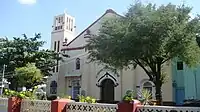 St. Isidore the Farmer Parish Church (Poblacion)
St. Isidore the Farmer Parish Church (Poblacion)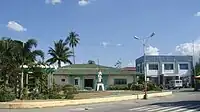 Police Station & Municipal Hospital (Poblacion)
Police Station & Municipal Hospital (Poblacion)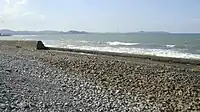 Laois beaches along coastal shores of Lingayen Gulf
Laois beaches along coastal shores of Lingayen Gulf Uyong river, beaches and shores
Uyong river, beaches and shores
References
- ↑ Municipality of Labrador | (DILG)
- ↑ "2015 Census of Population, Report No. 3 – Population, Land Area, and Population Density" (PDF). Philippine Statistics Authority. Quezon City, Philippines. August 2016. ISSN 0117-1453. Archived (PDF) from the original on May 25, 2021. Retrieved July 16, 2021.
- 1 2 Census of Population (2020). "Region I (Ilocos Region)". Total Population by Province, City, Municipality and Barangay. Philippine Statistics Authority. Retrieved 8 July 2021.
- ↑ "PSA Releases the 2018 Municipal and City Level Poverty Estimates". Philippine Statistics Authority. 15 December 2021. Retrieved 22 January 2022.
- ↑ "Labrador, Pangasinan: Average Temperatures and Rainfall". World Weather Online. Retrieved 12 October 2015.
- ↑ Census of Population (2015). "Region I (Ilocos Region)". Total Population by Province, City, Municipality and Barangay. Philippine Statistics Authority. Retrieved 20 June 2016.
- ↑ Census of Population and Housing (2010). "Region I (Ilocos Region)" (PDF). Total Population by Province, City, Municipality and Barangay. National Statistics Office. Retrieved 29 June 2016.
- ↑ Censuses of Population (1903–2007). "Region I (Ilocos Region)". Table 1. Population Enumerated in Various Censuses by Province/Highly Urbanized City: 1903 to 2007. National Statistics Office.
{{cite encyclopedia}}: CS1 maint: numeric names: authors list (link) - ↑ "Province of Pangasinan". Municipality Population Data. Local Water Utilities Administration Research Division. Retrieved 17 December 2016.
- ↑ "Poverty incidence (PI):". Philippine Statistics Authority. Retrieved December 28, 2020.
- ↑ "Estimation of Local Poverty in the Philippines" (PDF). Philippine Statistics Authority. 29 November 2005.
- ↑ "2003 City and Municipal Level Poverty Estimates" (PDF). Philippine Statistics Authority. 23 March 2009.
- ↑ "City and Municipal Level Poverty Estimates; 2006 and 2009" (PDF). Philippine Statistics Authority. 3 August 2012.
- ↑ "2012 Municipal and City Level Poverty Estimates" (PDF). Philippine Statistics Authority. 31 May 2016.
- ↑ "Municipal and City Level Small Area Poverty Estimates; 2009, 2012 and 2015". Philippine Statistics Authority. 10 July 2019.
- ↑ "PSA Releases the 2018 Municipal and City Level Poverty Estimates". Philippine Statistics Authority. 15 December 2021. Retrieved 22 January 2022.
- ↑ "2019 National and Local Elections" (PDF). Commission on Elections. Retrieved March 6, 2022.
External links
- Labrador Profile at PhilAtlas.com
- Municipal Profile at the National Competitiveness Council of the Philippines Archived 2017-02-02 at the Wayback Machine
- Labrador at the Pangasinan Government Website Archived 2019-01-19 at the Wayback Machine
- Local Governance Performance Management System
- Philippine Standard Geographic Code
- Philippine Census Information